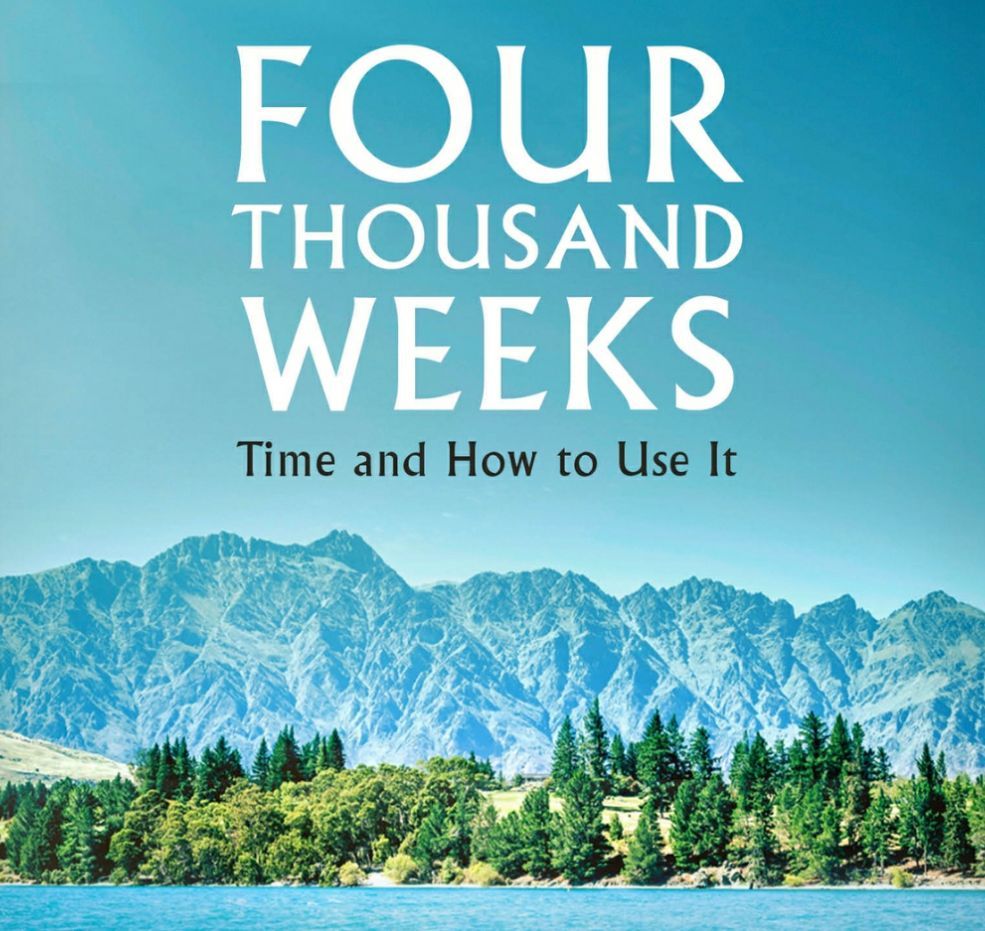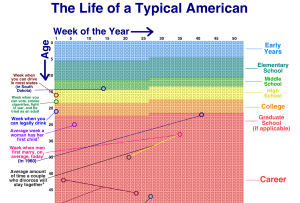Four Thousand Weeks: Time Management for Mortals by Oliver Burkeman
Four Thousand Weeks is a must-read for any modern professional. Once you start thinking about your life in weeks, you think twice before wasting a single day.

Four Thousand Weeks is a must-read for any modern professional.
One of the most powerful self-motivating techniques is putting things into (a different) perspective. Once you start thinking about your life in weeks, you think twice before wasting a single day.
Tim Urban masterfully pictured this for the visual learners among us:

This assumes that you live by 90, whereby the average life expectancy in the European Union is 81,3 years (84 for women and 78,5 for us, poor guys).
Oliver Burkeman rounded the number of weeks to four thousand as the average lifespan:
The average human lifespan is absurdly, insultingly brief. Assuming you live to be eighty, you have just over four thousand weeks.
And every year, we get fifty-two opportunities to choose how we'll spend a week of our life. Calculate your age and see how far on that map you already are.
[-ouch; I'm more than halfway through]
As a lifelong student of time management and productivity, I have already accepted that I'll never get everything done. I only wish I'd found that out sooner. Time management is a myth in the sense that we don't get to manage it — time just is. We are time.
If you live for the weekends, you've wasted over 70% of your time — each and every week. Love what you do, and you'll do what you love.
Highlights from Four Thousand Weeks: Time Management for Mortals by Oliver Burkeman:
So, let me not waste too much of your n-thousandth week before you get your copy of Four Thousand Weeks:
[this is was so Me!]:
You know how some people are passionate about bodybuilding, or fashion, or rock climbing, or poetry? Productivity geeks are passionate about crossing items off their to-do lists.
[profound]:
the more you confront the facts of finitude instead – and work with them, rather than against them – the more productive, meaningful and joyful life becomes.
FOMO, the ‘fear of missing out’, because you come to realise that missing out on something – indeed, on almost everything – is basically guaranteed.
‘missing out’ is what makes our choices meaningful in the first place.
[work-tip]:
Acquire a reputation for doing your work at amazing speed, and you’ll be given more of it. (Your boss isn’t stupid: why would she give the extra work to someone slower?)
[Inbox Zero is a myth — because that's outside of our control!]:
the process of ‘getting through your email’ actually generates more email.
The technologies we use to try to ‘get on top of everything’ always fail us, in the end, because they increase the size of the ‘everything’ of which we’re trying to get on top.
[ponder this]:
Once you truly understand that you’re guaranteed to miss out on almost every experience the world has to offer, the fact that there are so many you still haven’t experienced stops feeling like a problem.
[solution]:
You have to choose a few things, sacrifice everything else, and deal with the inevitable sense of loss that results.
[get your NOT-to-do list ready]:
the core challenge of managing our limited time isn’t about how to get everything done – that’s never going to happen – but how to decide most wisely what not to do, and how to feel at peace about not doing it.
The real measure of any time management technique is whether or not it helps you neglect the right things.
work on your most important project for the first hour of each day, and to protect your time by scheduling ‘meetings’ with yourself, marking them in your calendar so that other commitments can’t intrude.
A more fruitful approach to the challenge of living more fully in the moment starts from noticing that you are, in fact, always already living in the moment anyway, whether you like it or not.
[before you buy a Porsche or run away with a lover]:
midlife crisis, because midlife is when many of us first become consciously aware that mortality is approaching – and mortality makes it impossible to ignore the absurdity of living solely for the future. Where’s the logic in constantly postponing fulfilment until some later point in time when soon enough you won’t have any ‘later’ left?
the unspoken fantasy that you might one day finally reach the state of having no problems whatsoever.
Social media is a giant machine for getting you to spend your time caring about the wrong things
Let me wrap these notes up with this one:
now is all you ever get.
For a ton of such nuggets, read the whole book: Four Thousand Weeks; it's a worthwhile reading investment.


10 Time Management tips & trips for Working (from home)

Tim Urban's post: Your Life in Weeks

Read more of my productivity content!
💌 Enjoyed this post? Don't miss the next ones by subscribing here.







